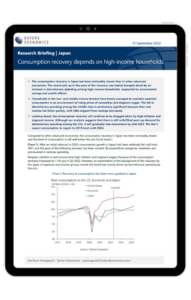Japan’s consumption recovery depends on high-income households

The consumption recovery in Japan has been noticeably slower than in other advanced economies. The recent pick up in the pace of the recovery was mainly brought about by an increase in discretionary spending among high-income households, supported by accumulated savings and wealth effects.
What you will learn:
- Households in the low- and middle-income bracket have barely managed to maintain essential consumption in an environment of rising prices of necessities and stagnant wages.
- The fall in discretionary spending among the middle class is particularly significant because their real income has fallen quickly, with little support from savings and assets.
- Although our analysis suggests that there is still unfulfilled pent-up demand for discretionary spending among the rich, it will gradually lose momentum by mid-2023. We don’t expect consumption to regain its 2019 level until 2024.
Tags:
Related posts

Post
How Asia’s supply chains are changing | Techonomics Talks
Global supply chains have continued to expand, despite talk of deglobalization and nearshoring. US and Japan have started to de-couple from China, but other G7 countries grow more dependent on Chinese inputs. Several "hotspots" are emerging across Asia with multiple winning formulas.
Find Out More
Post
BoJ to raise its policy rate cautiously to 1% by 2028
We now project that the Bank of Japan will start to raise its policy rate next spring assuming another robust wage settlement at the Spring Negotiation. If inflation remains on a path towards 2%, the BoJ will likely raise rates cautiously to a terminal rate of around 1% in 2028.
Find Out More
Post
Japan inflation to rise to 1.8%, but downside risks are high
Reflecting a surprisingly strong Spring Negotiation result and weaker yen assumption, we have upgraded our baseline wage and inflation forecasts. We now project higher wage settlements will push inflation towards 1.8% by 2027. Uncertainty is high, however.
Find Out More